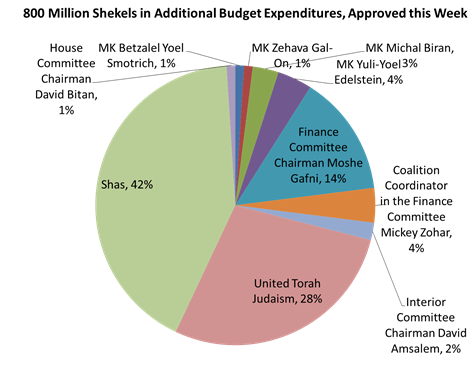IDI: Stop Budget Corruption
Ultra-Orthodox and smaller political parties must be prevented from exploiting process
Regarding today's vote on the state budget: The Israel Democracy Institute calls for cancelling the law by which governments fall apart (vote of no confidence) if state budgets are not passed. The current system negatively impacts the ability of members of Knesset to make sound decisions on behalf of the country, leads to corruption and members acting for personal and party gain.
Regarding today's vote on the state budget: The Israel Democracy Institute calls for cancelling the law by which governments fall apart (vote of no confidence) if state budgets are not passed. The current system negatively impacts the ability of members of Knesset to make sound decisions on behalf of the country, leads to corruption and members acting for personal and party gain.
Looking at the budget numbers published by the government earlier this week (see graph), it appears that several smaller parties (namely the ultra-Orthodox parties of Shas and United Torah Judaism) and individual members of Knesset are receiving large sums of money totally 800 million shekels of the several billion shekel budget for causes that are only relevant to the people who voted for them. This is as a result of political horse-trading in return for their votes for the budget. It is unacceptable and proves the weakness of the current political system, which makes it too hard for the government to properly function.
The IDI believes that it is time to end this shameful ritual and recommends changing the rules of the game and adopting new procedures that would require allocations based on universal criteria. Violating the criteria should only be permissible in rare circumstances. The IDI also recommends that in order to neutralize political pressure on the eve of the budget vote, an amendment should be passed that would cancel the automatic dispersal of the Knesset that currently occurs if the budget is not passed by its deadline. This amendment should be passed among a series of changes that would improve the electoral system and eliminate the ability of elements in the coalition -- sometimes even an individual Knesset member -- to extort the prime minister and the entire government at the expense of the wider public interest.

